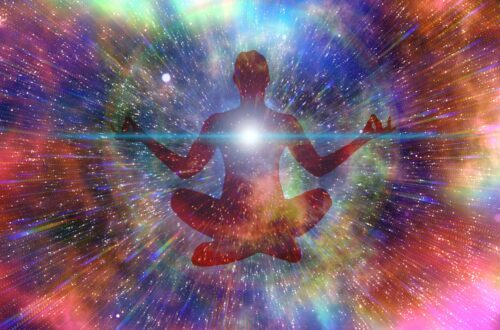
Mind Beyond Death
A friend, knowing my interests, recommended the book, Mind Beyond Death by Dzogchen Ponlop Rinpoche. I just read through the forward and the introduction and decided to write about it. My previous article on death, “The Eight Stages of Death” garnered a lot of interest so I thought people might be interested in this also.
This book was based on a series of 14 lectures on the six bardos or intermediate states of existence the author gave at the 2002 Treasury of Knowledge Retreat in San Antonio, Texas. It was evidently a powerful experience for the students attending. After a lot of prodding, he eventually agreed to edit his lectures for publication.
The Indian Master, Padmamsambhava
This book is a retelling of a story heard centuries ago by students of the great Indian Master, Padmasambhava who achieved the greatest accomplishment of all. Rinpoche describes it as,
“the realization of the stainless and indestructible nature of his own mind that instantly dispels illusions, even the fearful illusion of death. It is said that Padmasambhava departed this world in a mass of rainbow light, leaving behind many precious instructions and descriptions of his journey of transformation for students of the future.”
It is said that he who hears this story and takes it to heart will be changed by it. He takes you on a journey where you are the main character and the end result is up to you. It is a story about life, birth, death, and the transcendental truths of our existence as humans.
The Importance of Preparing for Death
Most of us intellectually understand the facts of life and the inevitability of death, but we don’t want to face it. In our materialist culture many of us think when death comes, that’s it. There will be nothing left that will survive death. It’s understandable then that most of us would rather talk or think about anything else but death, so we ignore it.
However, Rinpoche tells us, this is not a wise choice to make. He says,
“If we have ignored death all our lives, then it will come as a big surprise. There will be no time on death’s bed to learn how to handle the situation, no time to develop the wisdom and compassion that could guide us safely through death’s terrain. We will have to confront whatever we encounter there as best we can—and that is a genuine gamble.”
He then asks why take the risk? Why meet this moment unprepared, when we have the chance to prepare for it? He says,
“If we choose denial, then, when we meet the Lord of Death, we will be like an innocent youth walking into a late night gambling den with a pocket full of cash. What are the odds we will be richer and happier in the morning?”
Prepared or not, Rinpoche says, we all will meet the Lord of Death. The Buddhists believe the Lord of Death is invincible.
How to Defeat the Lord of Death
Who is this Lord of Death that inspires so much fear in people?
According to the Buddhists, he is invisible and represents impermanence and karma. Only the one with true wisdom and compassion can beat him, clean the table and walk away with all the money in the morning.
So this book is about how to defeat the Lord of Death and come away with all the money in the end.
Most people don’t want to prepare for this fight. Death is too painful to face. For most of us, it represents the end of all that we are, and the loss of everything we hold dear. Rinpoche quotes Woody Allen as an example. Allen said,
“I’m not afraid of dying; I just don’t want to be there when it happens.”
Death and Birth Take Place Continually in Our Lives
Buddhists say that Death and Birth take place continually. Rinpoche quotes Paul from the Bible as saying, “I die every day”.
He says, learning about dying is part of the process of living. Death takes place every day, and in every moment of every day. We die to each moment, only to be reborn in the next. He asks, “how can we become aware of that?”
He says we have to ask ourselves two basic questions.
-
“What does death mean to me personally, from my own experience of life?”
-
“What’s my most basic, visceral feeling about death?”
The Buddhists say, to die well we must live well. He then asks, “Is it because we don’t know how to live fully, that we are afraid of dying?”
To overcome our fear of death we must face it, rather than deny it. Rinpoche says,
“We must connect with death through genuine reflection. We must contemplate its image with a calm and clear mind, not just with the image of death that our thoughts have created on the basis of superstition and rumor. We must actually see and feel that state nakedly.”
He says to meet death fully, we must die every day to everything, including our thoughts, our agonies, our emotions and our loving relationships.
Whenever we hang on to a grudge, an anger, even a positive emotion we are running away from death. Death is a process of change. If we don’t die to every moment, then we can’t be reborn anew in the next moment. We have to learn to let go.
The Illusion of Continuity
Rinpoche says what we call life is an illusion of continuity like a stream of thoughts, emotions or memories. We see them as ours. We think they define us and tell us who we are, but they don’t. It is just our ego’s way to survive by maintaining control.
Rinpoche says this about continuity,
“It consists of single moments, which arise, dissolve and then arise again, like waves on an ocean. Therefore, this “I” arises and dissolves in each moment as well. It does not continue from one moment to the next.”
But are these “I”s, that arise and dissolve, the same “I”s? Rinpoche answers by saying,
“These two “I”s cannot be said to be the same or different, yet they are identified by our conceptual mind as a single, continuous self.”
We Must Learn to Die to Each Moment
It is the continuous arising and dissolving of each moment that keeps it fresh and unique. If the moments were continuous, life would then become stagnant as there would be no room for change. One moment would lead to the next in a chain of causation over which we would have no control.
It is only through death, that the new and the creative can be born. Only by dying every day can we be truly in contact with life.
This is the mind of the realized Padmasambhava. It is a primordial awareness.
Rinpoche says,
“When we truly know that with every ending, there is also renewal, we begin to relax. Our minds become open to the process of change. We feel we can actually touch reality and are no longer afraid of death. We can learn to live well and fully now, with the understanding that death is not something apart from life.”
So that is the introduction to the book, Mind Beyond Death. The lesson here is to become aware of dying to each moment. To do that we must let things go and not get stuck in our mind and feelings on events in our lives. Wipe the board clean and begin anew.
It’s not easy. That’s why it is a process. It allows us to get a better handle on death, which paradoxically will also give us a better handle on life. If we can’t die well, we can’t live well. To prepare for death, we can become aware of dying to each moment and being reborn in the next.
To learn more about the magic of the universe: Click this link: The Magical Universe.
Image by Karin Henseler from Pixabay




